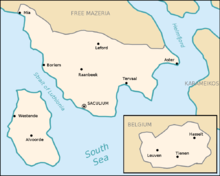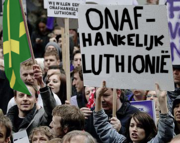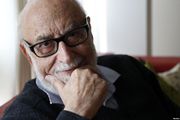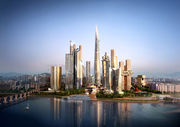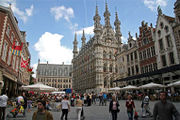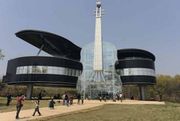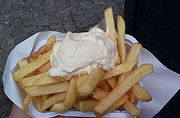Nation/Luthionia
| Republic of Luthionia Republiek Luthionië (Dutch) République de Luthionie (French) |
||||||
|---|---|---|---|---|---|---|
|
||||||
| Motto: "Knowledge is power, and we're pretty clever" | ||||||
| Anthem: Freedom | ||||||
| Region | Mazeria | |||||
| Capital and largest city | Saculium | |||||
| Official languages | Dutch, French, English | |||||
| Demonym | Luthionian | |||||
| Government | Federal Presidential Constitutional Republic | |||||
| - | President | Sacul Nagrem (SP.A) | ||||
| - | Vice President and Prime Minister | Mark Devos (SP.A) | ||||
| - | Deputy Prime Minister | Deline Tew (LLD) | ||||
| Legislature | Parliament | |||||
| - | Upper house | Senate | ||||
| - | Lower house | Chamber of Representatives | ||||
| History | ||||||
| - | Independence from Belgium | January 13, 2002 | ||||
| Area | ||||||
| - | Total | 83,746 km2 32,335 sq mi |
||||
| GDP (PPP) | 2014 estimate | |||||
| - | Total | US$889.3 billion | ||||
| - | Per capita | US$34 200 | ||||
| Gini (2013) | 25.8 low |
|||||
| HDI (2014) | 0.898 very high |
|||||
| Currency | Merge (₥) (MRG) |
|||||
| Time zone | Central Mazerian Time/Central European Time (UTC-4/+1) | |||||
| Date format | dd*mm*yyyy | |||||
| Drives on the | right | |||||
| Calling code | 13 | |||||
| ISO 3166 code | LH | |||||
| Internet TLD | .lut | |||||
Luthionia (/'luθioʊnə/; Dutch: Luthionië; French: Luthionie), officially the Republic of Luthionia, is a federal republic containing territories in Mazeria and Europe. It is a founding member of the Mazerian Assembly, and is currently a member of its Security Council. Luthionia covers an area of 83 746 square kilometres (32 335 sq mi).
The nation consists of two main parts; Mazerian Luthionia, which is where the country's capital Saculium is located, and European Luthionia, the nation's original territory. The Mazerian section of Luthionia lies upon the continent of Meridia. The European section is located within Belgium in Western Europe. Luthionia only gained independence from Belgium quite recently, on the 13th of January 2002. When it first gained independence Luthionia consisted of a rather small territory surrounding the city of Leuven, at that time its capital. Four years later it acquired new land in Mazeria, and soon afterwards a new capital was constructed there. This new capital was named Saculium.
Contents
History
Luthionia’s history is short but eventful. After the coupe in Belgium, in which King Philippe I was overthrown and replaced by right-wing politician Bart De Bever, many Belgian citizens weren't happy with the new government. De Bever introduced new legislation, criminalising offences such as singing in public or leaning on benches. Finally the city of Leuven and its surroundings decided to declare independence from Belgium. Soon enough the international community recognized the newly founded state of Luthionia, but Belgium wouldn’t accept it. Only after the pressure from influential nations grew too large did De Bever relent and recognize Luthionia as an independent state, on the 13th of January 2002. This final milestone in the fight for Luthionian independence is now celebrated yearly.
Since Luthionia’s independence, its population has exploded. This is due to two large factors. After Luthionia’s independence there was much rejoicing, approximately nine months later followed by a baby boom. It also became a refuge for other Belgians fleeing the country's new oppressive government. Especially this second factor has played an enormous role in Luthionia's rapidly increasing population. Soon the nation became one of the most densely populated countries in the world, and something had to be done. The state tried to buy Greenland off Denmark, but the deal got called off at the last moment due to public opinion, as nobody wanted to go and live in such a cold climate. Then it purchased some small islands in the Pacific, but nobody wanted to live there either due to the heat, the insects and the isolation. Finally Luthionia managed to acquire a large and beautiful territory in Mazeria, and the majority of its population has now moved to these newly acquired lands.
Initially Luthionia’s capital was the city of Leuven, but due to the fact that the majority of Luthionians live in Mazerian Luthionia, the decision was made to move the capital to this part of the country. A referendum was held, and Saculium was elected to be Luthionia’s new capital. As the city was basically still under construction, a large area was reserved for the building of the government headquarters, which have recently been completed.
Politics
Luthionia is a federal republic governed by a President, a Prime Minister and Council of Ministers, and a bicameral legislature consisting of a Chamber of Representatives and a Senate.
Executive Branch
The President is elected for a five-year term (no term limits) by direct popular vote. The Prime Minister is formally chosen by the President but determined by the coalition parties forming a parliamentary majority. The Deputy Prime Minister is also chosen by the President, on the advice of the Prime Minister. The other Ministers are appointed by the President after discussion with all of the nation's major parties. The current President is Sacul Nagrem, the Prime Minister is Mark Devos and the Deputy Prime Minister is Deline Tew.
Legislative Branch
The Senate (Dutch: Senaat; French: Senat) consists of 75 seats. 50 members are directly elected by popular vote, and the remaining 25 are elected indirectly. The members serve a five-year term. The Chamber of Representatives (Dutch: Kamer van Volksvertegenwoordigers; French: Chambre des Representants) has 150 seats. Its members are directly elected by popular vote on the basis of proportional representation to serve five-year terms.
Judicial Branch
The Constitutional Court (Dutch: Grondwettelijk Hof; French: Cour constitutionelle) consists of 12 judges who are appointed for life by the President from candidates submitted by Parliament. The Supreme Court of juctice (Dutch: Hof van Cassatie; French: Cour de Cassation) is organized into 3 chambers: civil and commercial; criminal; social, fiscal, and armed forces. Each has a chairperson and 12 judges appointed for life by the President from candidates submitted by the High Council of Justice, a 25-member independent body of judicial and non-judicial members.
National Political Parties
There are a multitude of political parties in Luthionia. Listed here are the seven most popular parties in the nation, ordered by most votes in the previous elections:
| Party | Leader |
|---|---|
| Social Progressive Alternative (SP.A) | Sacul Nagrem |
| Luthionian Liberal Democrats (LLD) | Sofiya Ven |
| Christian Democratic and Luthionian (CD&L) | Nathalie Van Bael |
| Conservative Luthionia (CL) | Jan Beeken |
| The Communist Party (CP) | Walter Borremans |
| Green! | Timo Tinlot |
| Luthionian Nationalistic and Patriotic Union (LNPU) | Jacob De Decker |
International Politics
Luthionia is a member of the World Assembly, in which it is represented by Benjamin Van Cutsem. Luthionia is also one of the nine founding members of the Mazerian Assembly, in which it currently has a place in the Security Council. The Luthionian representative there is Frederik Dekelver. Another international alliance that Luthionia is a prominent member of is the MUSCAN, the Mazerian Union of Socialist and Communist Aligned Nations.
Geography
Luthionia consists of two regions. Mazerian Luthionia accounts for the largest portion of the country. It is located in Southern Mazeria, upon the continent of Meridia. It borders Free Mazeria at its Northern boundary, and the rest of it is surrounded by water. To its East, across the Helmfjord, lies the The United Kingdom of Canada and Britain. Other nearby nations are the People’s Democratic State of RS Dynasty and the Protectorate of Impuesto. Luthionia’s capital, Saculium, lies on mainland Mazerian Luthionia, at the coast.
European Luthionia lies within the centre of Belgium, which it used to be part of. Its main city is Leuven, which is also its former capital, and houses one of the world’s most prestigious universities. The area is completely landlocked.
Economy
As Luthionia is a relatively new nation its economy is still in its infancy, but it's growing rapidly all the same. It has a GDP of $1.6 trillion and a GDP per capita of $2951. 1.2% of the GDP is composed of agriculture, 22.3% is industry, and 76.5% comes from services. Luthionia has its own currency, the Merge (1$ = 2.6327₥), but is planning on also adopting the new Mazerian regional currency that is currently being worked on. The inflation rate is 1.9%, and unemployment lies at 12.4%. 6.9% of the nation's population lives below the poverty line.
Luthionian trade partners:
| Import nation | Percentage of total import | Export nation | Percentage of total export |
|---|---|---|---|
| RS Dynasty | 15.9% | Impuesto | 15.2% |
| Germany | 14.9% | RS Dynasty | 14.9% |
| Impuesto | 12.9% | Germany | 13.3% |
| France | 11.0% | UKCB | 12.5% |
| UK | 10.4% | UK | 10.3% |
| US | 9.7% | France | 10.2% |
| UKCB | 8.1% | Belgium | 9.8% |
Military
The Luthionian Armed Forces aren't one of the world's largest armies, as only 0.8% of the GDP goes to military funding. Military service is voluntary and the service age is 18 years of age for both men and women. The Armed Forces consist of three main components: the Land Force, the Naval Force and the Air Force. The operational commands of the three components are subordinate to the Staff Department for Operations and Training, which is headed by the Chief of Staff of the Luthionian Armed Forces. This position is currently held by General Adam Elo.
Science and Technology
Luthionia is a very advanced nation when it comes to science and technology. This is mainly due to the fact that it houses one of the world's top universities relating to these fields, Leuven University. Students come from all over the world to study in its halls, which also makes it one of the world's most multicultural universities. Its rector is Rik Torfs.
So far Luthionia has only had one Nobel Prize winner, but the government is confident that many more will follow. In 2013 François Englert won the Nobel Prize for Physics for coming up with the concept of the Higgs mechanism. A potential future Nobel Prize laureate is Nele Bakelants, a world-renown cancer researcher. She is doing research in Leuven towards a cure for breast cancer, and rumour has it that she is pretty close to achieving that goal. If she does, there isn't a doubt that she will win the Nobel Prize for Medicine.
Another field off research that Luthionia is doing well in is space exploration. The LASE (Luthionian Agency for Space Exploration), under the lead of Mia Coppens, has already completed several missions, the most recent being the construction of a space station. The joint Luthionia-RS Dynasty station, named Stella, has been in service for several months now.
Demographics
80% of Luthionia's population live in urban areas. Currently 86% of the population are Luthionian citizens, though obviously most of these weren't born in Luthionia. Next in line are the Belgians, constituting 7% of the population. The population growth rate is 1.13%, which is mainly due to the relatively high net migration rate. The fertility rate is 1.67 children per woman.
Largest Luthionian cities:
| Rank | Name | Population |
|---|---|---|
| 1 | Saculium | 1 982 000 |
| 2 | Alvoorde | 1 435 000 |
| 3 | Raanbeek | 1 356 000 |
| 4 | Westende | 1 202 000 |
| 5 | Leuven | 1 025 000 |
| 6 | Borlem | 998 000 |
| 7 | Aster | 923 000 |
| 8 | Mia | 875 000 |
| 9 | Tervaal | 856 000 |
| 10 | Hasselt | 801 000 |
Languages
Luthionia has three official Languages: Dutch, French and English. Official documents are always in all three languages, and children get taught all three languages from the first year of primary. Most Luthionians have Dutch as their mother tongue, but in Northern Luthionia, in Leford and the area surrounding it, there are a lot of francophones. Nearly everybody has at least a basic knowledge of English, and most can speak it quite fluently. Both Luthionian Dutch and Luthionian French have minor differences in vocabulary and semantic nuances from the varieties spoken respectively in the Netherlands and France. The English spoken in Luthionia is standard English.
Education
Education is compulsory from 6 to 18 years of age for Luthionians. The level of education is high, not the least because children are expected to learn to speak three languages fluently. 21.1% of the GDP is spent on education. Luthionian universities are also world-renowned, especially the University of Leuven.
Religion
The majority of Luthionia's population is atheist, 56% to be precise. The most popular religion is Roman Catholicism, which constitutes 31% of the population. Despite the nation being one of the world's least religious, the University of Leuven has one of the world's most famous Departments of Theology and Canon Law.
Health
The Luthionians are known to enjoy good health. The nation's life expectancy at birth lies at 80.04 years (77.13 years for men and 83.1 years for women). There are 3.12 physicians and 7.1 hospital beds per 1,000 population. The leading causes of death are heart and vascular disorders, neoplasms, disorders of the respiratory system and unnatural causes of death such as accidents and suicide.
Healthcare in Luthionia is financed through both social security contributions and taxation. Health insurance is compulsory. Healthcare is delivered by a mostly private system of independent medical practitioners and hospitals. Most of the time each provided service is directly paid by the patient and reimbursed later on by health insurance companies. 17.6% of the nation's GDP is spent on healthcare.
Culture
Luthionia has a very varied culture, being influenced by nations both in Mazeria and in Europe.
Fine Arts
Luthionia's most famous artist is definitely the slightly quirky Julie Campbell, whose style changes along with her mood. She's gone through several stages in which she experimented with different media, going from conventional materials such as acrylic and pencil to less common ones like newspaper and nail varnish. Alissia Cockx is without a doubt the country's most prolific and impressive architect. Her work includes the Luthionian Government Headquarters, the Leuven Museum of Arts and the Mia College of Arts music department. In Luthionia's world of fashion, the main figurehead is Maïté Dewit. She both designs and models her own clothes, and her collections are sold all over the world. A notable Luthionian author is Lucas Caden, who made millions with his best-selling fantasy trilogy 'Nothing Much'.
Luthionian music is also getting itself a name in the world. Axolotl has made songs featuring world famous artists such as Taio Cruz, Sia and Lady K. Singer-songwriter Stromae has brought out several chart toppers, such as 'Alors On Dance', 'Formidable' and 'Papaoutai'. All his songs are sung in French. Another popular musician who sings in English is Ozark Henry.
Luthionian cinema is mainly Dutch and English. The most famous actor who plays in Dutch is Matthias Schoenaerts, who won the César Award for Most Promising Actor in 2012. He played in 'Loft', 'Bullhead' and 'Rust and Bone', three of Luthionia's most successful films. In the English film scene Kay Mitchell stands out, a young actress who first gained fame at the age of eighteen in the film 'Independence', in which she plays the role of a young woman fighting for Luthionian independence. Her most recent success was her role in the first part of the trilogy ‘Nothing Much’, an adaptation for the screen of Lucas Caden’s books by the same name. Philippe Geubels is a popular comedian, and so is Alan Roziers, who has his own radio talk show and column in Luthionia Today.
Folklore
As Luthionia is a relatively new nation, there isn't much folklore around. There are relatively few processions, parades and such, not only because of the country's short history but also due to its large atheist community. One major non-official holiday is the Saint Nicholas Day, a festivity for children that is also celebrated in Belgium and the Netherlands.
Cuisine
Several highly ranked Luthionian restaurants can be found in the most influential restaurant guides, such as the Michelin Guide. Two specialties that Luthionia has kept from its time being part of Belgium are french fries with mayonaise and beer.
Sports
Sport isn't one of Luthionia's main specialties, but there are several famous sportspeople. Kim Clijsters was a famous tennis player who has been the World no. 1 in both singles and doubles. Tia Hellebaut is a high jump athlete who was the 2008 Olympic champion in the high jump, getting Luthionia its first Olympic gold medal.
External links
Luthionia's official NationStates page
Luthionia's page on the Mazeria Wiki


